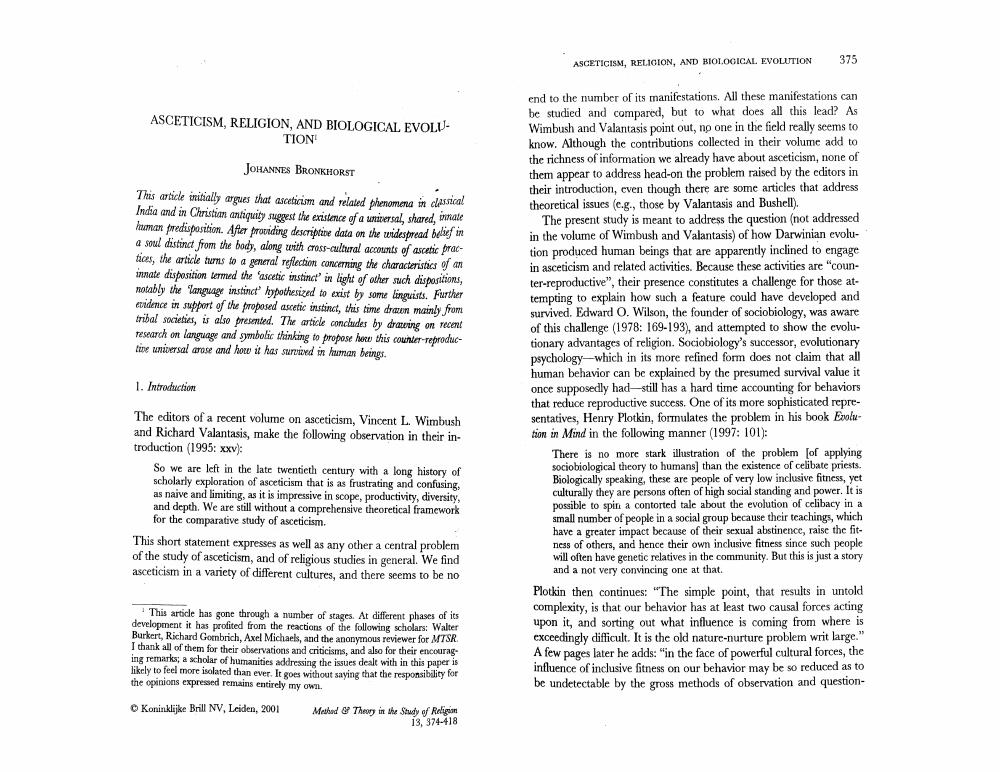Book Title: Asceticism Religion And Biological Evolution Author(s): Johannes Bronkhorst Publisher: Johannes Bronkhorst View full book textPage 1
________________ ASCETICISM, RELIGION, AND BIOLOGICAL EVOLUTION 375 ASCETICISM, RELIGION, AND BIOLOGICAL EVOLU TION JOHANNES BRONKHORST This article initially argues that asceticism and related phenomena in classical India and in Christian antiquity suggest the existence of a universal, shared, tinale human predisposition. After providing descriptive data on the widespread belief in a soul distinct from the body, along with cross-cultural accounts of ascetic practices, the article turns to a general reflection concerning the characteristics of an innate disposition termed the 'ascetic instinct in light of other such dispositions, notably the language instinct hypothesized to exist by some linguists. Further evidence in support of the proposed ascetic instinct, this time dracon mainly from tribal societies, is also presented. The article concludes by drawing on recent research ont language and symbolic thinking to propose hare this counter-reproductide universal arose and how it has survived in human beings. 1. Introduction end to the number of its manifestations. All these manifestations can be studied and compared, but to what does all this lead? As Wimbush and Valantasis point out, no one in the field really seems to know. Although the contributions collected in their volume add to the richness of information we already have about asceticism, none of them appear to address head-on the problem raised by the editors in their introduction, even though there are some articles that address theoretical issues (c.g., those by Valantasis and Bushell). The present study is meant to address the question (not addressed in the volume of Wimbush and Valantasis) of how Darwinian evolution produced human beings that are apparently inclined to engage in asceticism and related activities. Because these activities are "counter-reproductive", their presence constitutes a challenge for those attempting to explain how such a feature could have developed and survived. Edward O. Wilson, the founder of sociobiology, was aware of this challenge (1978: 169-193), and attempted to show the evolutionary advantages of religion. Sociobiology's successor, evolutionary psychology which in its more refined form does not claim that all human behavior can be explained by the presumed survival value it once supposedly had still has a hard time accounting for behaviors that reduce reproductive success. One of its more sophisticated representatives, Henry Plotkin, formulates the problem in his book Exlu tion in Mind in the following manner (1997: 101): There is no more stark illustration of the problem for applying sociobiological theory to humans) than the existence of celibate priests. Biologically speaking, these are people of very low inclusive fitness, yet culturally they are persons often of high social standing and power. It is possible to spin a contorted tale about the evolution of celibacy in a small number of people in a social group because their teachines, which have a greater impact because of their sexual abstinence, raise the fitness of others, and hence their own inclusive fitness since such people will often have genetic relatives in the community. But this is just a story and a not very convincing one at that. Plotkin then continues: "The simple point, that results in untold complexity, is that our behavior has at least two causal forces acting upon it, and sorting out what influence is coming from where is exceedingly difficult. It is the old nature-nurture problem writ large. A few pages later he adds: "in the face of powerful cultural forces, the influence of inclusive fitness on our behavior may be so reduced as to be undetectable by the gross methods of observation and question The editors of a recent volume on asceticism, Vincent L. Wimbush and Richard Valantasis, make the following observation in their introduction (1995: xxv): So we are left in the late twentieth century with a long history of scholarly exploration of asceticism that is as frustrating and confusing, as naive and limiting, as it is impressive in scope, productivity, diversity, and depth. We are still without a comprehensive theoretical framework for the comparative study of asceticism. This short statement expresses as well as any other a central problem of the study of asceticism, and of religious studies in general. We find asceticism in a variety of different cultures, and there seems to be no This article has gone through a number of stages. At different phases of its development it has prodited from the reactions of the following scholars: Walter Burkert, Richard Gombrich, Axel Michaels, and the anonymous reviewer for MTR I thank all of them for their observations and criticisms, and also for their encourage ing remarks; a scholar of humanities addressing the issues dealt with in this paper is likely to feel more isolated than ever. It goes without saying that the responsibility for the opinions expressed remains entirely my own. Koninklijke Brill NV, Leiden, 2001 Method & Theory in the Study of Religion 13, 374-418Page Navigation
1 2 3 4 5 6 7 8 9 10 11 12 ... 23
